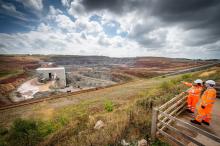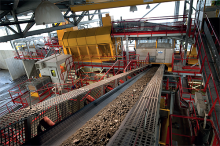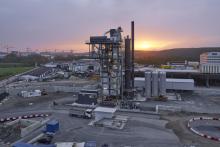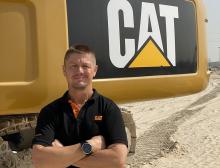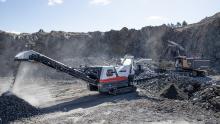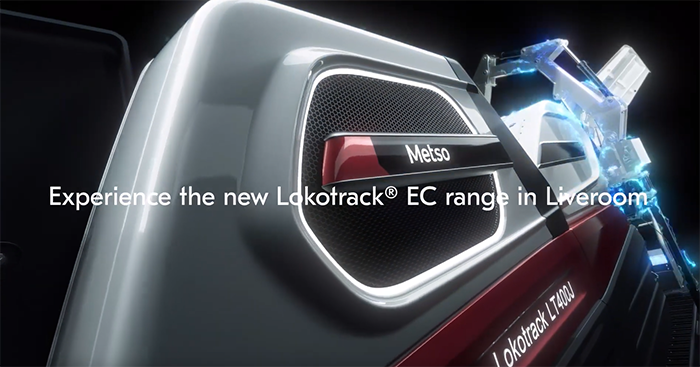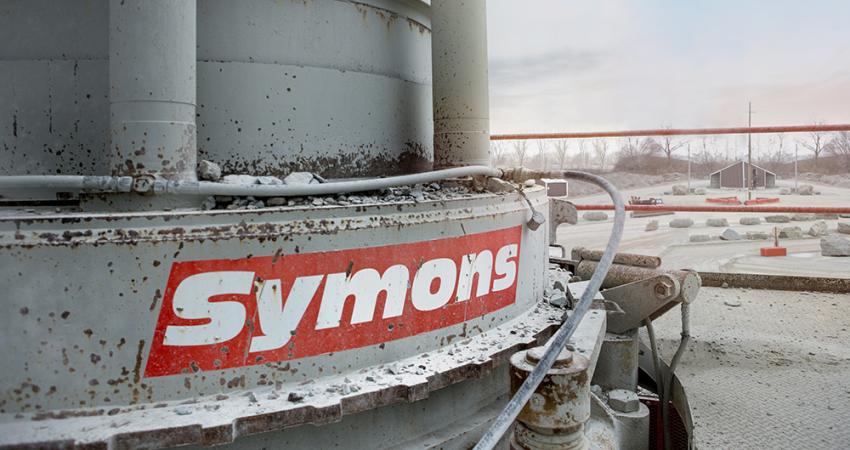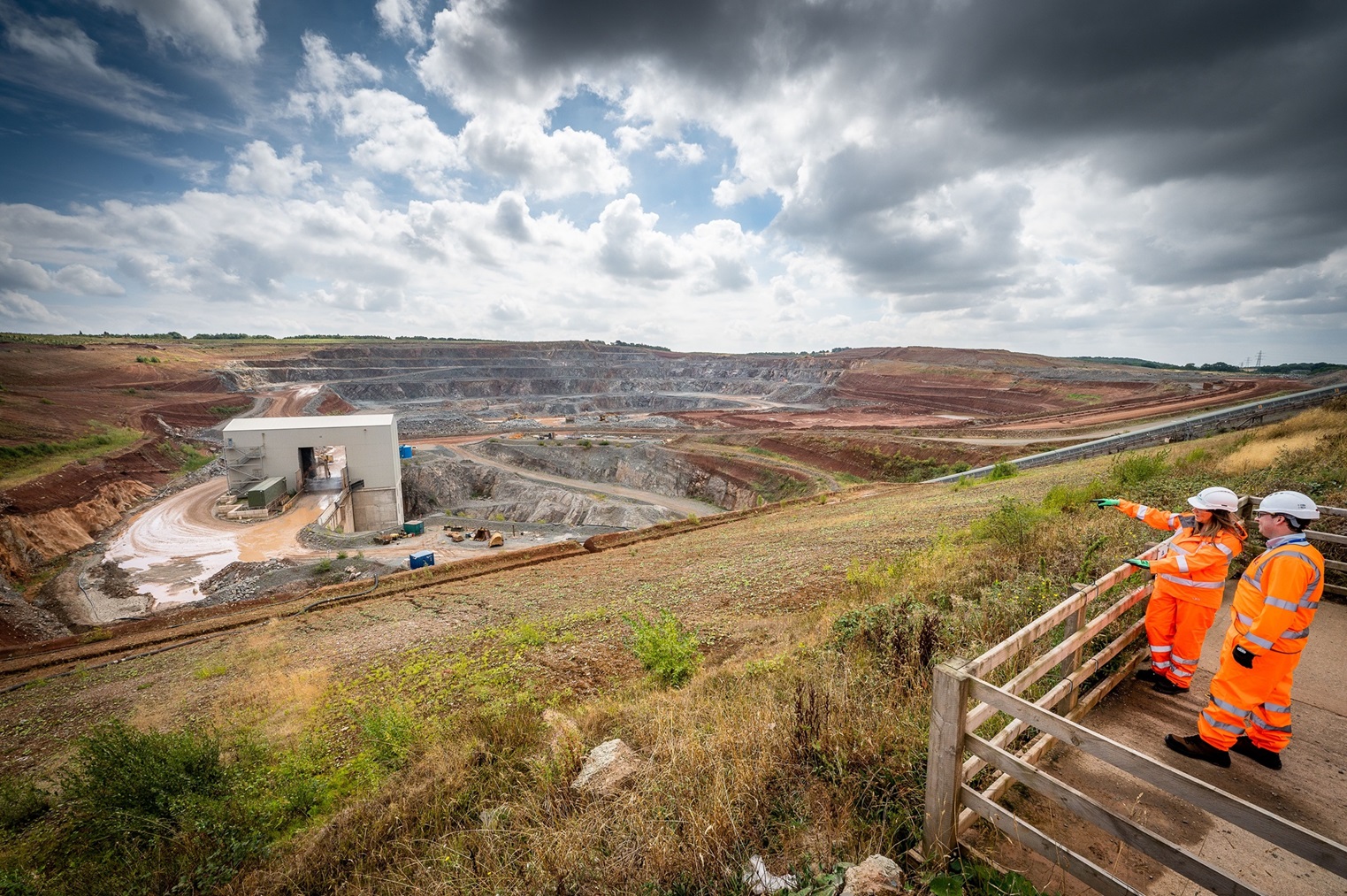
Among the UK's largest and most productive quarries, Aggregate Industries' Bardon Hill operation is a great example of industry best practice and a site renowned for the variety of its high-quality rock products. Guy Woodford reports.
How do you define a 'super quarry'? It would make a great pub quiz question, especially if directed at teams of thirsty post-shift quarry workers and geologists. Is it the volume of material processed? Is it the unusually large variety of final products? Is it a combination of the two? Or do you just know a super quarry when you see one?
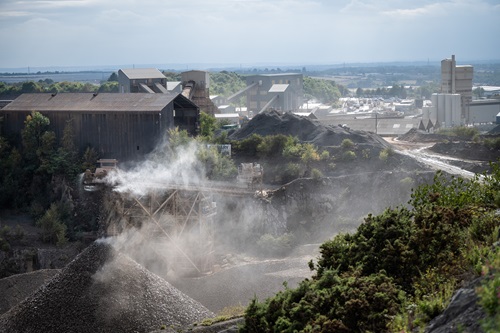
As I stand at a designated viewing point high above Aggregate Industries' four-million-tonnes-plus-a-year Bardon Hill Quarry, 'super' is an adjective that comes to mind.
During my tour of the vast 1,000-acre-plus site [including farmland], I'm told that Bardon Hill is one of two Aggregate Industries' super quarry sites, the other being 15 million tonnes a year Glensanda, Europe's largest granite quarry, occupying a remote peninsula north of Oban, off Scotland's north coast. For context, building a house takes around 60 tonnes of aggregate.
A geological Site of Special Scientific Interest east of Coalville in Leicestershire, central England, Bardon Hill has operated for more than 400 years and exposes rocks from an andesitic Precambrian volcano, similar to the 1995 Montserrat eruption in the West Indies about 570 million years ago. This activity produced the andesites and volcaniclastics quarried at Bardon Hill today. Some of the site's deposit has quartz veins containing native copper and gold.
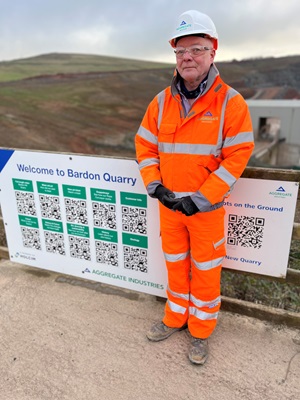
Currently staffed by 109 Aggregate Industries employees and 49 contractor workers, Bardon Hill produces around 20 core products, such as crushed rock fines (CRF), 2/6mm, 4/10mm, and rail ballast. These products can then be sold as they are or blended at any desired proportion to meet the specific demands of most customer requests.
By blending the core products, it allows Bardon Hill to adapt to the individual needs of the customer. In 2023, the quarry sold over 120 products/blends to its customer base.
"Bardon Hill produced over four million tonnes of products in 2023, and we have a target to increase that this year," says Andy Jackson, quarry operations manager, Aggregates, at Bardon Hill Quarry.
Jackson says Bardon Hill is also meeting the growing demand for gabion and pitching stone to form embankment terracing, retaining walls and bridge abutments. "I had an email enquiry this morning to see if we could supply 300 tonnes of gabion for 100 days. If that comes off, that's great business. When you produce gabion and pitching stone, you get a by-product called 6F5 [recycled aggregate made up of crushed hardcore materials, including crushed concrete], which is also popular with our customers.
"We also produce products that are quite popular in reservoir restoration. We have bigger and smaller products to fill gaps and better protect the banks. The markets aren't what they were, so we are trying to do more with special products that can be lucrative."
Dust is another sought-after product. "It can go into concrete plants, asphalt plants, concrete slabs, and other final products," notes Jackson. "We wash the dust on-site, taking the real fines out of it and using them as a replacement for sand. That means that if you want sand for your asphalt plant, for example, you don't have to import it."
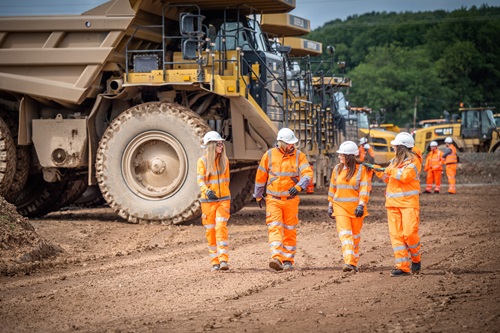
Jackson explains that ensuring access to future mineral reserves is critical for Aggregate Industries and other major and small-to-medium-sized aggregate producers. Planning permission is being sought to extract around 55 million tonnes of primary material from a large piece of land adjacent to the current Bardon Hill quarry pit, which has around 86 million tonnes of reserves.
"It's about a ten-year process to get planning permission, so we need to start it now. To extract this year's production target, I've got to move 2.4 million tonnes of clay overburden. I don't expose the rock if I don't move the clay. It's a huge undertaking!"
Loading, hauling, and overburden removal at Bardon Hill are contracted out to Walters Plant Hire. BAM is contracted to do the site's drill and blast work using a pair of Epiroc drill rigs and a Cat 336 excavator with a breaker attachment. Blasting occurs at the quarry twice a week, usually Tuesdays and Thursdays.
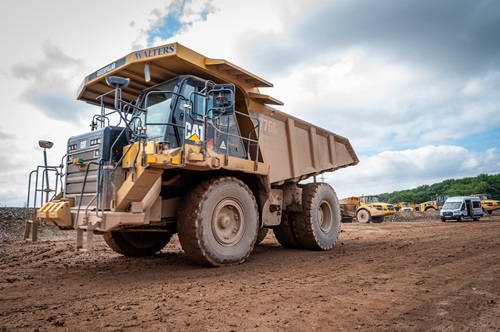
"We've worked with Walters Plant Hire since 2012. It is one of only a few companies that can handle what we need to be handled. We offer our contractors five-year contracts, encouraging them to invest in their machine fleets," explains Jackson.
During my visit, Walters' new Cat 992 large wheeled loader and a new Komatsu 1250LC-11 hydraulic excavator were among the machines at work in the quarry pit. They were assisted by three Cat 777 and four Cat 775G off-highway trucks.
"On a normal day, we'll load from three different areas [of the quarry pit]. We'll have two on the main production and one on development. This gives us a good mix of primary material to work with."
A 2.7 km-long conveyor takes quarried and gyratory crusher-processed aggregate to the nine secondary and tertiary cone crushers and screeners. Bardon Hill predominantly uses Metso Nordberg crushers but has a Quarry Manufacturing & Supplies (QMS) in its lineup. "We have got quite good with the secondary crushers at measuring wear against the sample products coming out. If the sample products start losing shape and getting elongated, we reline the crusher to stop it from wearing out.
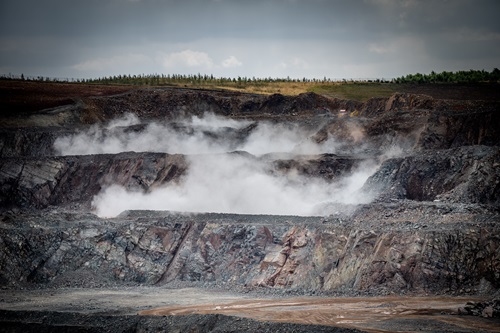
"A year ago, we put a bypass screen in our primary crusher line that scalps off sub-base. This means that rather than going through the plant to make a sub-base, the sub-base is taken out of the primary crushed product. That gives you a cleaner feed for the secondary crushers, enabling you to make a better product."
A second 1.8km conveyor, which includes an eye-catching Doppelmayer RopeCon high-angle conveying system, takes the material to the crushers and screeners from the vast former quarry, now overburden pit, adjoining the current primary Bardon Hill Quarry excavation site. The final product generated from the overburden pit is being used to elevate the pit so that further granite can be extracted at some stage.
"When the Doppelmayer [RopeCon] is loaded, it generates enough power to power up the whole of the overburden [conveyor] system and five regular rock conveyors," stresses Jackson.
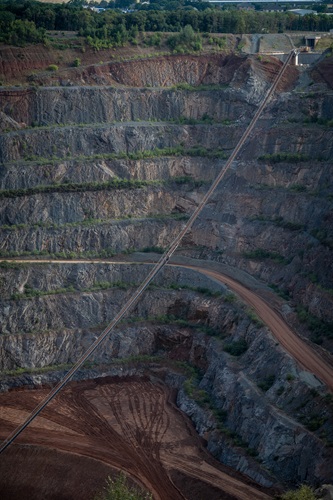
I ask about the large lagoons below us in the overburden pit. "We are constantly dewatering at this time of year and are switching to electric-powered pumps. Contractors used to take care of it, but I brought it back in-house to reduce cost and gain efficiency."
Bardon Hill uses washing plants on its special aggregate products, like surface dressing, which comprises a thin film of binder, generally bitumen or tar, sprayed onto the road surface and then covered with a layer of stone chippings. "There tends to be a season for surface dressing, and it's getting earlier and earlier."
The primary extraction pit at Bardon Hill Quarry operates Monday to Friday, 7am to 6pm, with the overburden pit running from 7am to 8pm. Secondary and tertiary crushing and screening teams work between 6am and 10pm Monday to Friday. Weekends are usually ringfenced for site and machine fleet maintenance.
Driving alongside Bardon Hill's two huge conveyors, Jackson says that Aggregate Industries, which has more than 4,000 employees across the UK, is partnering with outside agencies to fund solar panels on grass banks alongside the quarry and overburden site conveyors. These panels, and potentially others that could be placed on top of the conveyor belts' protective roofing, would generate site electricity, helping to reduce carbon emissions as part of the company's drive to achieve net zero by 2050.
Bardon Hill's solar panels would produce an estimated 10 megawatts, roughly 9-10 million KW/hrs. The conveyors, when running loaded, have the potential to produce 250 KW/hr of power. They reduce associated road haulage, have helped reduce the quarry's dumper truck fleet by two-thirds, and have provided an annual CO₂ saving of 3,888 tonnes. Bardon Hill is also looking at the business case for running wind turbines on-site. As a company, Aggregate Industries has 30 MW of energy projects in development and aims to generate 50 MW at sites by 2025.
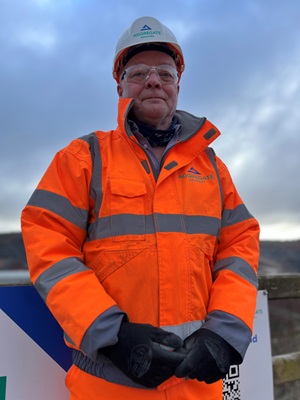
There is a rail siding as we reach the end of the conveyors and the secondary and tertiary crushers. "We have about eight [aggregate product] train runs a week. We are pushing and pushing to get more by-rail-delivery sales. We could do up to 25 trains a week. Each train contains about 1,400 tonnes of product," says Jackson. "Transporting aggregate by rail takes many lorries off the road."
Driving me around the quarry in an electric vehicle, Jackson says Bardon Hill is experimenting with HVO [hydrotreated vegetable oil] instead of diesel to power some of its machine fleet.
Bardon Hill, situated within Bardon Hill Quarry, is the highest point in Leicestershire, 276 metres above sea level. With the hill and the overburden pit as our backdrop, Jackson talks about the quarry's efforts to conserve and enhance nature and biodiversity.
"We found our first Charnwood Red spider last year. They are very rare, and this quarry is said to be the perfect habitat for them. We also have peregrine falcons, bats and badgers; we do all sorts of work around rehousing badgers in safer areas. We lost about three months quarrying last year in one corner of the quarry after finding peregrine falcons nesting. We had 8.5 kilometres of newt fencing at one time, catching thousands of endangered newts. There were nine ponds in the quarry, and people came in every morning, put the newts in buckets and dropped them in one of the ponds. We've had longhorn cattle and black sheep grazing on parts of the site. When I came here in 2011, we still had farmers working part of our land. We also planted 40,000 trees during one quarry extension and 60,000 during another."
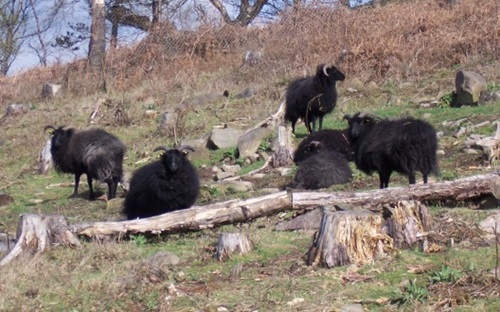
Jackson says Aggregate Industries created an up to £400,000 fund for the local community when it secured its last local authority planning permission to operate at Bardon Hill. Since then, the company, formed in 1997 following the merger of Bardon Group and Camas, the former aggregates business of English China Clays, has donated to many social and sports clubs in northwest Leicestershire. "I think there's around £37,000 left," he adds.
"One of the challenges is to get young people into this industry," Jackson continues. "They don't realise the great potential in it. I took one lad on when he was 18, who is now in his mid-20s and has just bought his first house. Few companies can tell an 18-year-old, 'Come here, and you can build a career with us until you retire'. I've worked for this company for over 30 years and have never been refused a training course.
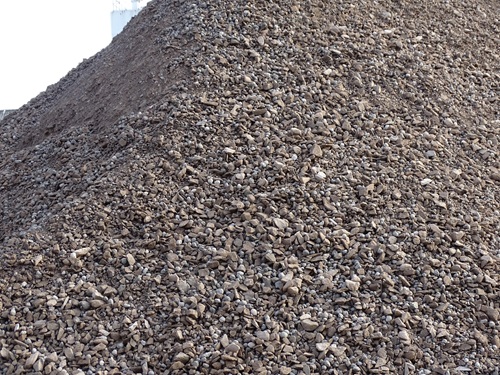
"We welcome students from the University of Derby (Centre for Mineral Products Professional Development] and the University of Leicester. They come to the site, and for those that show a particular interest, I bring them back for a week and put them in different departments so they can see how we work. One young lady went into our materials testing laboratory for half a day and loved it. It sparked her interest."
Jackson said Bardon Hill's lab technicians are constantly testing final product samples. "It helps us know when to do the crusher relining. We may also test aggregates if the customer believes there's an issue with their order."
Bardon Hill is also home to a thriving asphalt production business. "We have a Benninghoven asphalt plant and a Standard Havens plant; the latter is for the bigger tonnage. Both plants work 24/7. More UK road works are being done at night now, so the asphalt has to be available for those projects.
"We have a mixture of customers for all our quarry products. We work with many councils, and then there's HS2 [the UK's new high-speed rail network]. We also work with Balfour Beatty and other big infrastructure and construction companies. Our special products can be sent to customers a lot further away."
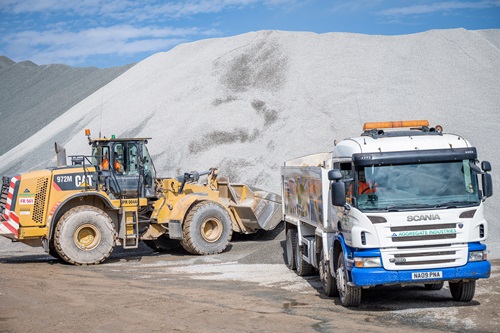
Bardon Hill asphalt resurfaced the world-renowned Donington Park motor racing circuit – just over ten miles from Bardon Hill Quarry in Castle Donington. "That was a big project," exclaims Jackson.
I'm curious about the biggest changes Jackson has seen during his career in the UK aggregates industry. "The emphasis on safety is the biggest. It's the number one priority. When I started, if you got hurt, my first company would say, 'Come back when you're better', and they'd get someone else in to do your job."
Jackson says more and more of his work is now being done electronically. "I have a tablet that I fill in and send off [to the quarry's digital data management system]. A big focus for Aggregate Industries is lost-time reduction. I have a 25% target for one part of the operation and 15% for three others. We generate more money for the business if we hit those targets."
We are back at the Bardon Hill site offices, and it's time for Jackson to say goodbye after my extensive and fascinating tour. He and the rest of the site's team can be proud of their efforts to enhance Bardon Hill's deserved super quarry status.

